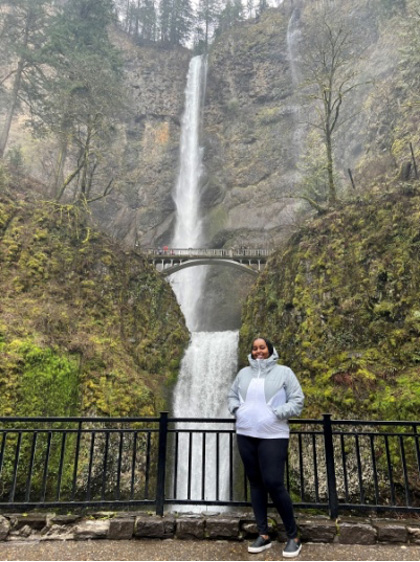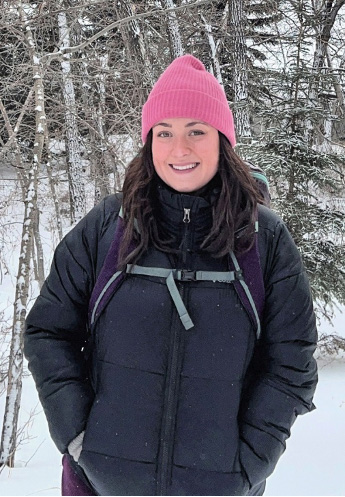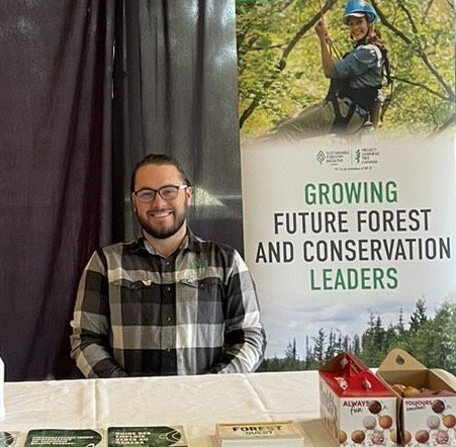These three SFI staff members may work full-time, but that didn’t stop them from furthering their professional education.
Lydia Kidane, SFI’s Manager of Career Pathways Partnerships, recently earned a Professional Science Master (PSM) in Water Resource Management at the Center for Agriculture, Urban Sustainability, and Environmental Science (CAUSES) at the University of the District of Columbia (UDC). The PSM focuses on environmental quality management, including water quality monitoring, assessment, and treatment; water quality modeling and simulation; hydrological analysis; performance analysis of green infrastructure; best stormwater management practices; stream restoration, and other skillsets.
“I wanted to increase my education and skills to address the global challenges of water availability, quality, and sustainability,” said Kidane. “The interdisciplinary nature of the program provided a deep knowledge of the physical, chemical, and biological sciences applicable to urban systems, and helped me build skills in environmental policy, communication, business management, project management, ethics, and leadership. Although this program is designed for working professionals, I found it difficult to manage school and work at times.”

Lydia Kidane, SFI’s Manager of Career Pathways Partnerships, visited Oregon’s famed Multnomah Falls while she was in the area for the 2023 Project Learning Tree (PLT) Annual Conference in Stevenson, Washington, in March.
Kidane had an “aha” moment during an assessment of a stream in the Washington, DC, area.
“This stream was significantly impacted by the urban environment and had undergone a recent stream restoration project that included planting trees and vegetation to repair the riparian zone,” she said. “This was a visible example of how urban trees provide a huge service to protect our limited freshwater resources.”
Learn more about Kidane’s professional journey to become an Manager of Career Pathways Partnerships and PSM by reading her spotlight in the SFI-PLT-MANRRS Black Faces in Green Spaces: The Journeys of Black Professionals in Green Careers Guide.
Alix Olson, SFI’s Urban and Community Forestry Coordinator, recently became an International Society of Arboriculture (ISA) Certified Arborist. The credential shows that Olson demonstrated her knowledge and skills in all aspects of arboriculture, which is the care and management of trees, shrubs, and woody plants, often in urban environments. Olson holds a Bachelor of Science degree in Urban Forestry from the University of British Columbia.
Olson knew the exam for the credential would be difficult: She had taken it about two years ago and narrowly missed a passing score.
“The exam was much tougher than I thought it would be, and I still am pinching myself that I managed to pull it off. It gave me a much greater appreciation for those continuing their education, because this stuff is not easy!” she said.

Alix Olson, SFI’s Coordinator of Urban and Community Forestry, in the woods near her home in Alberta, Canada.
Maintaining ISA certification requires earning 30 continuing education credits per year.
“I am constantly attending virtual webinars learning about new and updated techniques and education in arboriculture, which has been great for me because I do a lot of research in my position at SFI,” Olson said. “I had the opportunity to attend my first ISA Annual Conference this year in Albuquerque, New Mexico. It’s extra special because of the opportunity to connect my recent certification with the announcement of SFI’s new Urban and Community Sustainability Forestry Standard.”
James Thordarson, R.P.F., SFI’s Forest Education Coordinator, has been welcomed as an Ontario (Canada) Registered Professional Forester (R.P.F.) by the Ontario Professional Foresters Association (OPFA), which is responsible by law for regulating the practice of professional forestry in Ontario.
Thordarson holds an honours Bachelor of Science Degree in Forestry from Lakehead University, in Thunder Bay, Ontario, a degree program that is accredited by the Canadian Forestry Accreditation Board. Thus, he satisfied the OFPA’s educational requirements. After completing his application forms, Thordarson began an 18-month period as a Provisional Member (R.P.F. in Training), during which he was mentored by another R.P.F.

James Thordarson, SFI’s Coordinator of Forest Education, at a recent Outland Youth Employment Program (OYEP) event to provide a network of green sector education, training, and career opportunities for Indigenous youth in Canada.
He also demonstrated his professional level ability, the professional, not merely technical, level of knowledge, skill, and judgment in a definable aspect of professional forestry. And he showed that he has the required knowledge of the relevant laws, policies, and practices related to the practice of professional forestry in Ontario. Now that he’s an R.P.F., Thordarson must adhere to the OPFA’s Codes of Ethics and Standards of Practice and must maintain his competence through mandatory continuing education.
“I pursued the R.P.F. designation so that I could continue to learn in a professional manner, as well as be able to showcase my own skills and experience,” said Thordarson. “And being an R.P.F. shows my education partners and the general public that I have the education, knowledge, and experience to work in forest education and am held accountable to my work by the OPFA.”
From now on, James Thordarson will proudly include “R.P.F.” after his name as he continues to support the creation and promotion of PLT Canada’s environmental education, forest literacy, and green career pathway work. Most recently he contributed to the digital resources Climate Change and Forests: From Seed to Carbon Sink E-Unit for Grades 9-12, and the Nature of Fire Activity Collection for Grades 6-8, as well as the newly released Canadian flagship curriculum, the Explore Your Environment: K-8 Activity Guide.
